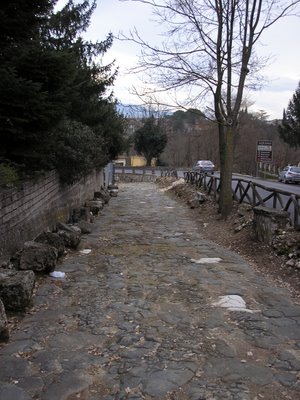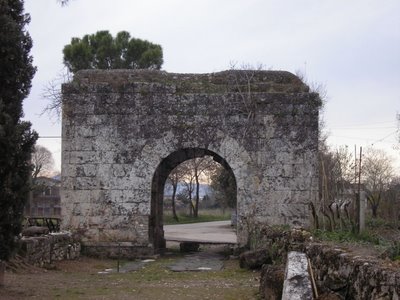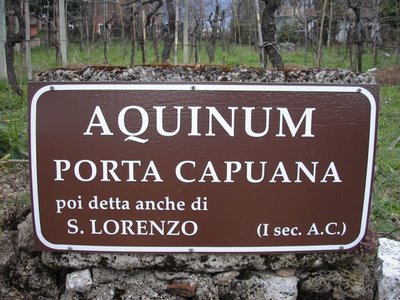Aquinum
My wife and I recently had some friends in town, one of whose maiden name is Aquino. Her predecessors, after coming to the U.S., are thought to have taken this surname from the name of their hometown in Italy (reminiscent of the naming of the Corleone family in Godfather). So while they were here, we decided to take a daytrip to find the old family stomping grounds, which are located south of Rome about halfway to Naples, sitting on a level plain near the mountains, within view of Monte Cassino. No train stops in somewhat small village of Aquino; rather, Aquino shares a station with a couple of other small towns nearby. We were told at the station that there are no buses and no taxis that go from the station to Aquino, so we walked a few kilometers to get to the actual town. There were a couple of interesting things I thought might be worth noting. First, Aquino is the birthplace of Thomas Aquinas. Here is the house he is said to have been born in:
Second, medieval and modern-day Aquino are built hard by the ancient Roman colony of Aquinum, thought by some to be the birthplace of Juvenal. The town in located on the Via Latina:
Here is the town gate and a modern sign placed there to label it:

The identification of Aquinum with Juvenal's birthplace is not, however, undisputed. The 1949 edition of the Oxford Classical Dictionary affirms that Juvenal was born there, citing Satire 3.319 as evidence. Here is the passage in context (the text is from The Latin Library):
'...his alias poteram et pluris subnectere causas, 315
sed iumenta uocant et sol inclinat. eundum est;
nam mihi commota iamdudum mulio uirga
adnuit. ergo uale nostri memor, et quotiens te
Roma tuo refici properantem reddet Aquino,
me quoque ad Heluinam Cererem uestramque Dianam 320
conuerte a Cumis. saturarum ego, ni pudet illas,
auditor gelidos ueniam caligatus in agros.'
It may be problematic, though, to take the line in the poem strictly biographically. Susanna Morton Braund, in Satires: Book I (Cambridge 1996), has the following comment on line 319:
'adj. tuo may mean 'your favourite' (cf. OLD 2b, cr. Suet. Galb. I Liviae...Veientanum suum revisenti) or 'your native' (perhaps supported by reddet: OLD 2). It is usually taken to indicate J.'s birthplace; however, this involves identifying Umbricius' interlocutor with the poet Juvenal: see Introduction sec. 2. Aquinum was a town in Latium on the via Latina c. 75 miles from Rome. This lover of Rome, who does not leave with Umbricius, may have a country seat in Aquinum.'
Turning to section 2 of the introduction, this is what we find:
'The second fundamental idea is one which rescues us from trying to read the satires as self-revelation. Roman verse satire uses the autobiographical monologue as the chief mode of presentation. This does not mean that the satirists are (necessarily) using their satires to convey their personal feelings to the world. Far from it. Authors in all genres of Roman literature, including Roman verse satire, were accustomed to creating characters....[I]n the personal genres of poetry--love elegy, lyric poetry, epigram and satire--the character (or persona, 'mask') is frequently presented as a first-person voice.
'Authors and their audiences were accustomed to this convention thanks to their experience of the education in rhetoric enjoyed by members of the Roman elite....The analogy between rhetoric and poetry is reinforced by the fact that most Greek and Latin literature, including poetry, was written for oral delivery by the author or another voice to a live audience. In the light of this, the identification of the views of the characters in satire with those of the authors becomes unnecessary and crude. To read the poems as autobiographical self-revelations from which 'facts' about the poet's life may be deduced (the 'biographical fallacy' propounded by, notably, Highet (1954)) is to neglect other, more rewarding, questions.' (pp. 2-3)
In addition to the line in the poem, an inscription from Aquinum is often used to justify the belief that Juvenal hailed from there. In the introduction to C.H. Pearson's and Herbert A. Strong's introduction to Thirteen Satires of Juvenal (2nd ed., Oxford 1892) we read the following:
'Decimus Junius Juvenalis is said in a life of uncertain authenticity to have born at Aquinum. This statement is to some extent corroborated by a line in the third Satire, where the speaker suggests that his friend, who is presumably Juvenal, may some day or other be visiting his own Aquinum. It is made more probable still by the fact that a tablet has been dug up at Aquinum, in which D. Junius Juvenalis, of the cohort of the Dalmatians, duumvir quinquennalis, and flamen to the deified Vespasian, dedicates a shrine to Ceres. Helvina Ceres is alluded to in the third Satire as a deity reverenced at Aquinum. Further, there is no reason for referring to Juvenal to any other place but Aquinum, though a single scholiast says that some persons took him to have been a Gaul on account of his great size.' (p. 9)
More attestation comes from biographies, but these are often taken to be unreliable. Pearson writes:
'The biographies prefixed to his Satires in the MSS. are as numerous as they are satisfactory. Of these there are nine, seven of which are printed by Otto Jahn in his edition of 1851....Juvenal is said by all his biographers to have been the son or the adopted son of a wealthy freedman. His mother was named Septimuleia and was a townswoman of Aquinum. He had a sister, also Septimuleia, who married Fuscinus. He seems to have been brought up at a good school. His chief instructor, when he began to study rhetoric, was Protus of Berytus, a teacher who was noted for his provincial and antiquarian tastes, and whose practice it was to restrict the number of his pupils to three or four, and to converse with these in the Socratic fashion, rarely lecturing to them....The inscription at Aquinum shows that he served the most important magistracy in his native town, and held the honourable position of titular chaplain, so to speak, to Vespasian.' (pp. 9-11)
Braund, however, calls both the biographies and the inscription into question:
'Virtually nothing is known of the life and circumstances of Juvenal. It is not even certain that the name we give him, Decimus Iunius Iuuenalis, is correct. The ancient biographies seem worthless and even the best of these, attributed by Valla in his 1486 edition to 'Probus', offers the same kind of reconstruction from details in the Satires as presented by some recent scholars, a method which fails to take account of the generic convention of using first-person presentation....Nor is the inscription from Aquinum which was believe to depict Juvenal as commander of a Dalmation cohort reliable evidence, leaving aside the fact that it disappeared long ago; moreover, the date it suggested is earlier than other indicators. As Syme says, there is a 'scarcity of facts' in this field, although that has not prevented its being 'infested with credulity and romance'. His own assesment of the little evidence afforded by Juvenal's name and the poems leads him to suggest, tentatively, an African origin.' (pp. 15-16)


No comments:
Post a Comment